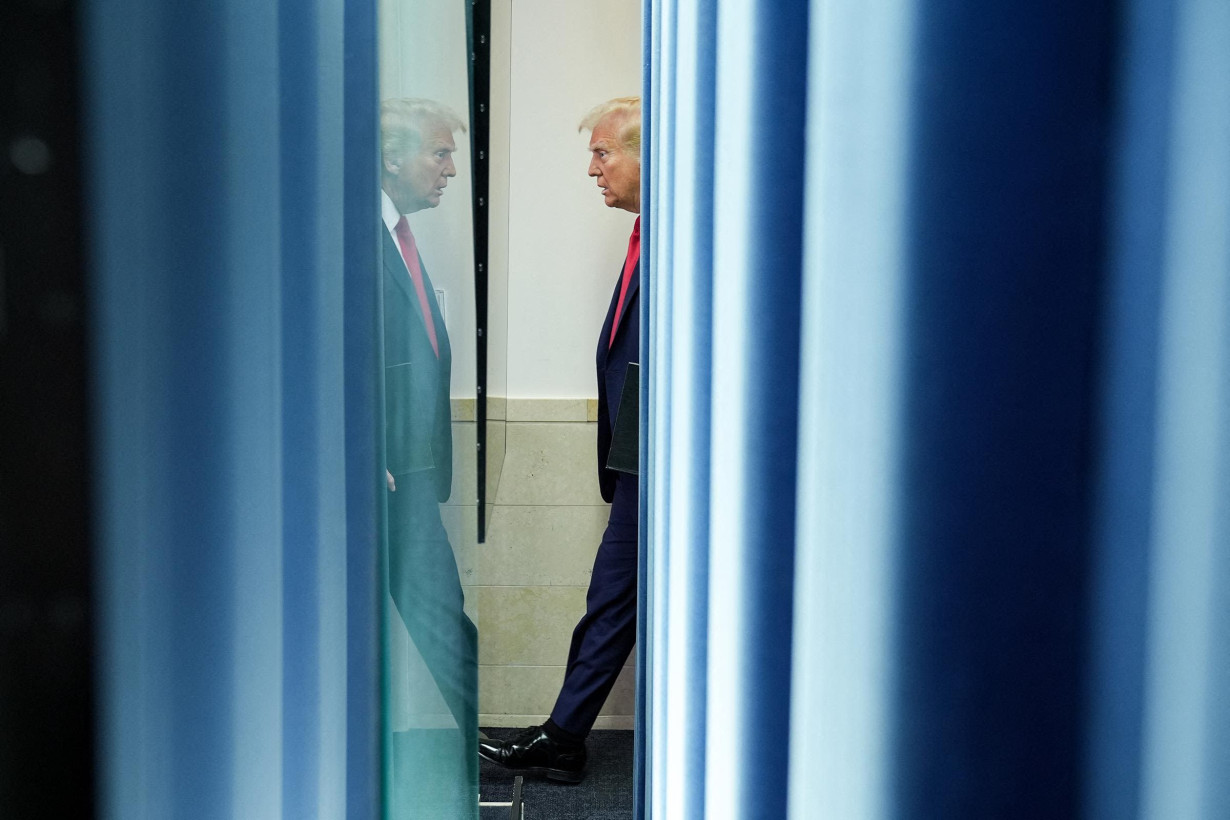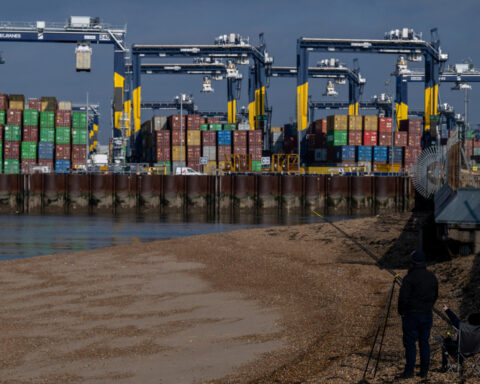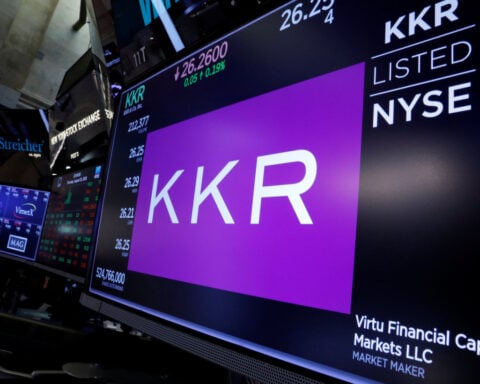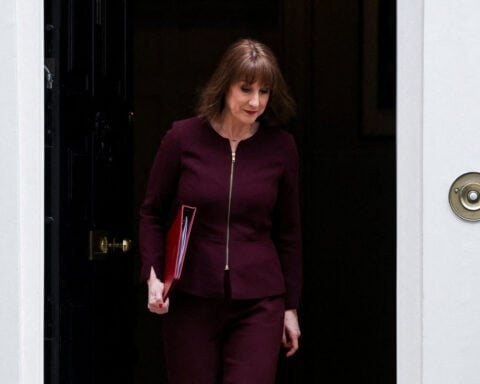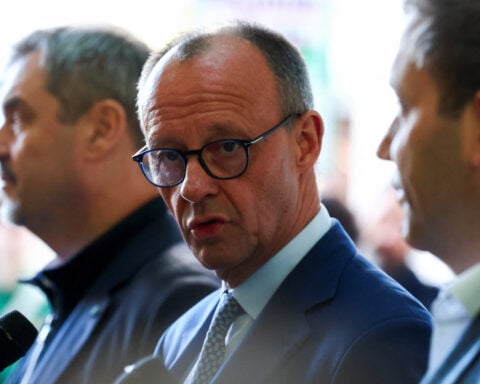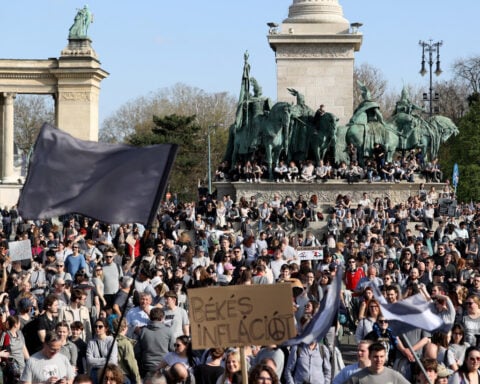(CNN) — President Donald Trump will move forward with aggressive new tariffs on Canada, Mexico and China on Saturday, the White House said, affirming he will stick to his February 1 deadline for the new duties that could have widespread effects on the economy.
“I can confirm that, tomorrow, the February 1 deadline President Trump put into place with a statement several weeks ago continues,” White House press secretary Karoline Leavitt said during Friday’s briefing.
Canadian officials are expected to meet with White House border czar Tom Homan on Friday in a bid to reach a deal that would stave off the proposed tariffs, according to two sources familiar with the meeting.
But asked later Friday in the Oval Office whether Canada, Mexico and China could do anything to stop the implementation of the tariffs, Trump said, “No.”
The White House’s confirmation of the new tariffs appeared to end speculation on whether the president would follow through on the pledge he made as a candidate to levy the new duties.
Leavitt said the tariffs would amount to a 25% duty on Mexico and Canada and a 10% tariff on China “for illegal fentanyl they have sourced and allowed to distribute into our country, which has killed tens of millions of Americans.”
“These are promises made and promises kept by the president,” she said.
She didn’t provide any details on precisely how the new tariffs would be implemented, only saying that the fine print would be available for public inspection within the next 24 hours. She similarly declined to say whether they will be applied to oil imports or whether additional exemptions will be included.
“Eventually we’re going to put tariffs on chips. We’re going to put tariffs on oil and gas. That’ll happen fairly soon,” Trump said later in the day, suggesting “around” February 18.
“We’re going to be putting tariffs on steel, aluminum, and ultimately copper. Copper will take a little longer, but it will happen quickly,” Trump said.
Trump also announced intentions to impose tariffs on pharmaceuticals, calling it part of a broader strategy to revive US industries.
“We’re going to build a tariff wall to bring pharmaceuticals back to America,” he said. “The way to do that is by putting up a wall— a tariff wall.”
Placing significant tariffs on the United States’ biggest trading partners serves as a gamble that taxing American companies for imported goods will ultimately punish the countries that make stuff Americans want — and bring those nations to the negotiating table. But it’s a risky bet that could easily backfire on American consumers and the economy.
“There could be some temporary, short-term disruption, and people will understand that,” Trump said when pressed by reporters on the cost of tariffs being passed on to consumers.
Trump earlier this week dismissed the idea that American consumers were reliant on imports from its two North American neighbors.
“We don’t need what they have,” Trump said, referring to Canada and Mexico.
Economists largely believe that, in limited circumstances, tariffs can be effective tools for economic growth. Trump has used and promised to employ tariffs for three primary purposes: to raise revenue, to bring trade into balance and to bring rival countries to the negotiating table.
Trump has said he wants Canada and Mexico to stop the flow of undocumented immigrants and illegal drugs into the United States. And for China, Trump has said tariffs would be aimed at forcing the country to make good on what he said was a stated promise to him that the government would execute people caught sending fentanyl to the United States.
Mexico’s president said Friday that her country was awaiting any potential US tariffs with a “cool head.”
“We have a Plan A, Plan B and Plan C for whatever the US government decides. It is very important for the people of Mexico to know that we will always defend our people’s dignity, our sovereignty, and engage in dialogue as equals,” President Claudia Sheinbaum told journalists at a daily news conference.
“No one — on either side of the border — wants to see American tariffs on Canadian goods,” Canadian Prime Minister Justin Trudeau said Friday afternoon in a statement on X.
“I met with our Canada-U.S. Council today. We’re working hard to prevent these tariffs, but if the United States moves ahead, Canada’s ready with a forceful and immediate response,” he added.
A delegation of senior Canadian officials has been in Washington for several days, meeting with various administration officials to try to avert the imposition of 25% tariffs. And Canada’s behind-the-scenes effort could turn into a full-court press if the levies go into effect. Premiers from all of Canada’s provinces — led by Ontario Premier Doug Ford — are planning to travel to Washington on February 12 for a larger mission.
Tariffs in certain circumstances do not cause inflation problems. Trump’s first-term tariffs did not meaningfully raise inflation, although they were far narrower in scope than what he is currently proposing, and the Covid-19 pandemic skewed some of the inflationary aspects of the tariffs — many of which remained in place during the Biden administration.
But mainstream economists largely agree that tariffs cause inflation. That’s because importers — not the countries exporting the goods — pay the tax, and they typically pass that cost onto consumers in the form of higher prices. New research from the Peterson Institute for International Economics suggests Trump’s aggressive tariff campaign will force American consumers to pay more for practically everything — from foreign-made sneakers and toys to food.
Trump’s proposed tariffs could add $272 billion a year to tax burdens, according to Karl Schamotta, chief market strategist at Corpay Cross-Border Solutions. The Peterson Institute has estimated Trump’s proposed tariffs would cost the typical US household over $2,600 a year.
Still, some proponents of Trump’s plan say the risk is worth the reward. Jamie Dimon, CEO of JPMorgan, last week told CNBC that if tariffs cause a little inflation but address a national security issue, then people should “get over it.”
Tariffs far more sweeping than Trump’s first term
The proposed tariffs expected on Saturday would hit a far wider range of goods than anything Trump has previously imposed.
During his first term, Trump’s tariffs hit roughly $380 billion of foreign goods, according to estimates from the Tax Foundation. The proposed tariffs on the nation’s three largest trading partners would hit about $1.4 trillion of imported goods, if there are no exemptions, the Tax Foundation said.
The figures underscore how aggressive and risky Trump’s tariffs would be, especially given how much prices have spiked since then.
“The administration is playing with fire,” said Joe Brusuelas, chief economist at RSM.
Brusuelas noted that the vast majority of imported US avocadoes are from Mexico, which faces a 25% tariff. “Go ahead and spike taxes on avocados ahead of the Super Bowl and watch how that turns out,” he said.
This story has been updated with additional details.
CNN’s Kayla Tausche, Matt Egan, Max Saltman, Betsy Klein and Alejandra Jaramillo contributed to this story.
The-CNN-Wire
™ & © 2025 Cable News Network, Inc., a Warner Bros. Discovery Company. All rights reserved.

 Trump has begun another trade war. Here's a timeline of how we got here
Trump has begun another trade war. Here's a timeline of how we got here
 Canada's leader laments lost friendship with US in town that sheltered stranded Americans after 9/11
Canada's leader laments lost friendship with US in town that sheltered stranded Americans after 9/11
 Chinese EV giant BYD's fourth-quarter profit leaps 73%
Chinese EV giant BYD's fourth-quarter profit leaps 73%
 You're an American in another land? Prepare to talk about the why and how of Trump 2.0
You're an American in another land? Prepare to talk about the why and how of Trump 2.0
 Chalk talk: Star power, top teams and No. 5 seeds headline the women's March Madness Sweet 16
Chalk talk: Star power, top teams and No. 5 seeds headline the women's March Madness Sweet 16
 Purdue returns to Sweet 16 with 76-62 win over McNeese in March Madness
Purdue returns to Sweet 16 with 76-62 win over McNeese in March Madness
